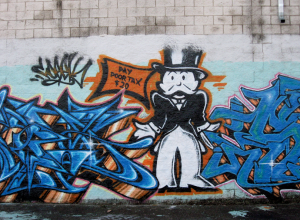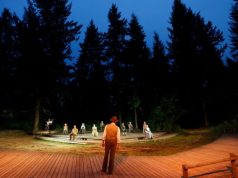
In Thomas Piketty’s recent work Capital in the 21st Century, the renowned French economist articulates the inherent process of wealth in a capitalist state being funneled into fewer and fewer hands over time. This is an exponential process as the increasing concentration of wealth (and therefore power) allows those who possess wealth to reconstruct their society in order to maintain and expand these conditions. This results in oligopoly–a state of limited competition–in which a market is shared by a small number of producers or sellers. This is the the modern form of capitalism. Given the significant impact capitalism has on the modern world, not just materially ideologically, it is vital to look how the dynamics of capitalism are reflected in every facet of our world.
We have a theatrical oligopoly in this country. There are a number of large companies that support themselves either through private donations and/or disproportionate amounts of funding from all levels of government. Stratford, Shaw and Soulpepper are three companies with resources beyond the imagination of the majority of theatremakers in this country. Full disclosure, I spent a period of my life on Soulpepper’s payroll and I saw first hand the benefits that their monetary scale has for the artists it employs. It was a very fruitful two years and the income security allowed me to grow as an artist and a person. It is nevertheless worthwhile to consider the effect that institutions of this size have on the broader theatre ecology.
These theatres have specific implicit or explicit bias as to what is interesting, what is worth putting on stage, and how to best convey that. They have, to greater or lesser degrees depending on the day, something like an theatrical aesthetic. This is fine and good: theatres should have aesthetics. However, the amount of influence these large theatres wield means that their aesthetic soon becomes everyone’s aesthetic. You can see evidence of this process at just about any indie theatre in Toronto. The basements and storefronts of this city might be thought of as places of bold experimentation. Instead they’re formally indistinguishable from the 20th century realism of major theatres. This is not a coincidence.
I noted on my first day of Soulpepper the number of artists at the company who had children. These children were often the offspring of two theatre artists. It amazed me that this theatre allowed artists to have children, own homes, take vacations. I’m still impressed by it. This theatre offers the dream of being a professional artist, not a professional server who makes a lot of art. It’s one of the few places in this country that allows access to this kind of dream. This means that many of the artists who want to achieve this dream are going to, consciously or unconsciously, become the actor, the writer, the designer, the director that Soulpepper needs: to become good in the very particular way that those who live this dream are good.
No university or college in this country is free from the anything-for-profit model of neo-liberalism. Post-secondary theatre programs are often fighting for their lives and so must continually prove their relevance to capital or risk having the program axed. One way to demonstrate this is by showing that their graduates land roles at major theatres. In order to ensure this occurs the curriculums will be turned towards producing actors that will be taken by the three S-theatres.
In my time at the Soulpepper I witnessed the students at George Brown College doing substantive amounts of work on Restoration Comedies and Wildean farces–neither of which make up the majority of the work in the Canadian theatre landscape, but both of which do make up a significant amount of the jobs at the Shaw and Stratford. Even though the majority of theatre school graduates will never have the chance to don fake moles and frolic around the stages of Stratford and Shaw or don the mid-century straight, white, male weltenschmerz of a Soulpepper production, the fact they’re all educated with these theatres as their ultimate goal has a significant effect on what students are taught. Moreover, it shapes fundamentally how they learn to think of themselves as artists.
Audiences are not exempt from being shaped into the kinds of audiences that these theatres want them to be. The S theatres, by dint of their scale, have the greatest ability to draw audiences. This draw is a combination of being able to hire well-known and well-respected artists, create shows with high production values, create comfortable and enjoyable performance spaces and to advertise their work so that it may be seen by more than the friends and family of the artists involved. The more audiences are fed on a diet of one theatre’s menu (as delicious and nutritious as that theatre’s fare may be) the more likely that audience will be to consider that menu as the only one. If the only place that an audience can see great actors supported by great production values is in a scant couple of large theatres audiences will begin to believe that the specific aesthetic viewpoint shown there is theatre and anything else is an aberration.
Being “anything else” is especially difficult for traditionally underrepresented groups. Shaw’s 2016 season features eight plays by men and two by women (with one of the two being a Chekhov adaptation). 92% of Stratford’s 2016 season has been written by men. Of Soulpepper’s 14-play January-August season two plays weren’t written by a man (and one of those was written by two women and a man). All three theatres are certainly working to increase the diversity in their cast and creative teams: Soulpepper has recently announced the big and small screen adaptation of Kim’s Convenience by Korean-Canadian playwright Ins Choi. The Shaw festival has gender parity in their directors and several of these directors are people of colour. Stratford went so far as to cast Araya Mengesha as Prince Hal in Breath of Kings their compilation/adaptation of Shakespeare’s history plays. Regardless, the problem of representation is built into the foundation of these theatres.
Stratford is focused on a Englishman from the 16th and 17th century. Shaw is focused on their namesake, his contemporaries and plays that occur within his lifetime. Soulpepper’s mandate is perform “modern classics”. Although Soulpepper’s mandate is flexible enough to allow writers like Choi and Suzan Lori-Parks the spiritual centre of the company lives in works like their recent production of Arthur Miller’s Incident at Vichy. These mandates, in the hands of the country’s most powerful companies, keep the artistic resources of some of our best artists tied up in the work of writers who are predominantly men, predominantly white, predominantly dead. This goes beyond the idea of representation of artists on and off stage. These dead white men carry with them values and ideologies of times long past. So long as the narratives and perspectives remain dominant in our theatre they will remain dominant in our culture.
Our theatrical oligopoly exists for the same reason the corporate oligopoly exists: the natural tendency for unchecked power to reinforce and solidify itself until it reaches a point of total, hegemonic dominance. I’ve been hosting a series of conversations with theatre makers in Toronto to discuss capitalism, colonialism and other topics of a political nature. At one of the meetings one of the attendees said, “So… what do we do?”. My answer is the same whether it’s corporate oligopoly or theatrical: agitate, educate, organize.









